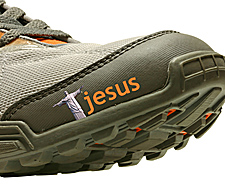 As Muslim groups worldwide protest the publication of Mohammed caricatures in a Denmark newspaper, Sydney Anglicans launched a quiet protest against an attempt by an Australian sportswear company to trademark the name Jesus.
As Muslim groups worldwide protest the publication of Mohammed caricatures in a Denmark newspaper, Sydney Anglicans launched a quiet protest against an attempt by an Australian sportswear company to trademark the name Jesus.
Sydney based Gomo Sportswear, who specialise in producing jerseys for sports teams and year 12 students, applied to trademark the word "Jesus' in April 2004. The trademark, which was declined, would have covered clothing, footwear and headgear.
However, Diocesan Legal Officer Steve Lucas was informed of the application and in September 2005 lodged a letter of protest to the Trademarks Examiner at IP (Intellectual Property) Australia expressing his concerns.
"We did not object to the trademark out of a desire to interfere with freedom of expression," says Mr Lucas.
"It was in fact the opposite as the trade mark, if registered, would have operated to stop another person from using the name Jesus in a manner which could be passed off as one of Gomo's products."
Mr Lucas protested on the grounds that the trademark "consists of scandalous matter'.
"The overwhelming majority of the Australian population would associate the name "Jesus' with Jesus Christ of Nazareth, whom Christians believe to be the son of God," Mr Lucas says.
"It would seem that it is simply an attempt by a secular business to leverage off the goodwill associated with the word Jesus for a commercial purpose."
Mr Lucas also had concerns that if the trademark was granted it could feasibly prevent churches and other Christian organisations using the word "Jesus' on clothing.
"It is not uncommon for t-shirts and other forms of clothing to be printed for church youth groups, camps and conferences. A trademark should not have the potential to interfere with legitimate religious expression," Mr Lucas says.
A reply letter from IP Australia Trademark Examiner, Michelle Scislo informed Mr Lucas that the trademark had not yet been accepted and so the process of opposing the trademark could not take place at that time.
The process of the application on the IP Australia website showed a number of adverse reports in relation to the trademark application and by December the trademark application had lapsed and been withdrawn.
"I don't know if our objections contributed to those adverse reports being issued," Mr Lucas says.
IP Australia Registrar of Trade Marks and Designs, Ruth Mackey, says it is likely that the trademark was rejected on the grounds of two sections of the Trade Marks Act 1995.
"We took into account section 42, that it was scandalous and section 44, that we didn't find it to be a distinctive trademark," she says.
This scenario is similar to an application process in Britain last year when the United Kingdom Trademarks Office rejected an application by Basic Trademark SA to register the word "Jesus' as a trademark for a myriad of products ranging from soaps and spectacles to whips and parasols.
According to website Brand Republic, Luxembourg-based clothing brand Jesus Jeans has also had its application for a trademark in the UK turned down by the Patent Office because the name is deemed "morally offensive'.
However, the brand has successfully registered the name "Jesus' in Belgium, the Netherlands, Luxembourg, Austria, France, Italy, and Spain but has been rejected in Germany, Switzerland, China, Hungary and Ireland.



























